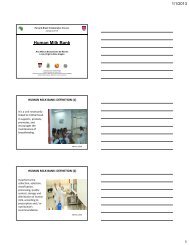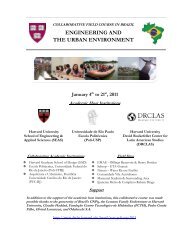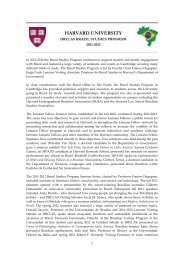Harvard - Brazil Office - DRCLAS - David Rockefeller Center for ...
Harvard - Brazil Office - DRCLAS - David Rockefeller Center for ...
Harvard - Brazil Office - DRCLAS - David Rockefeller Center for ...
Create successful ePaper yourself
Turn your PDF publications into a flip-book with our unique Google optimized e-Paper software.
ethnic and racial groups. The study will consider how these vary with perceived discrimination, and will<br />
compare the strategies used by individuals who face permeable group boundaries (e.g. negros in <strong>Brazil</strong>)<br />
and those facing boundaries that are strongly policed (e.g. Muslim citizens of Israel). The study will also<br />
compare whether and how anti‐racist strategies are influenced by national political and social ideology<br />
and integrate globally available cultural resources such as hip‐hop and Afrocentrism.<br />
Participating <strong>Harvard</strong> faculty: Michèle Lamont, Robert I. Goldman Professor of European Studies and<br />
Professor of Sociology and African and African American Studies (FAS) [Faculty Lead]; Nancy Krieger,<br />
Professor of Society, Human Development, and Health & Associate Director, <strong>Harvard</strong> <strong>Center</strong> <strong>for</strong> Society and<br />
Health, <strong>Harvard</strong> School of Public Health<br />
Collaborators: Elisa Reis, Professora Titular de Sociologia, Instituto de Filosofia e Ciências Sociais, Universidade<br />
Federal do Rio de Janeiro (UFRJ); support from the Weatherhead <strong>Center</strong> (WCFIA).<br />
Evaluation of Vertical Transmission of HIV in the State of São Paulo<br />
Epidemiological study of pregnant women diagnosed with HIV and their offspring born in 2006 in the<br />
state of São Paulo, where at least 30 percent of pregnant women with HIV do not receive the adequate<br />
course of antiretroviral prophylaxis and therapy. The goal of the study is to evaluate the magnitude of<br />
mother‐to‐child transmission (MTCT) in São Paulo, to identify failures in the prevention of MTCT, and to<br />
strengthen the integration of prenatal care with the diagnosis and clinical management <strong>for</strong> HIV and<br />
syphilis. Conducted with the <strong>Center</strong> <strong>for</strong> Reference and Training on HIV/AIDS of the State of São Paulo,<br />
<strong>Brazil</strong>, and funded by the National AIDS Program of the Ministry of Health of <strong>Brazil</strong>.<br />
This is only one of the research activities that HMS Prof. Arachu Castro is actively engaged with in <strong>Brazil</strong>.<br />
The larger project is: “The Latin America and Caribbean Prenatal Testing Initiative <strong>for</strong> HIV and Syphilis,”<br />
which is aimed at identifying barriers to testing <strong>for</strong> HIV and syphilis during pregnancy and to integrate<br />
prenatal care with the diagnosis and clinical management of HIV and syphilis in <strong>Brazil</strong>, Colombia,<br />
Dominican Republic, Nicaragua, Paraguay, Peru, and Uruguay. The Initiative is conducted<br />
collaboratively between <strong>Harvard</strong> Medical School and the National AIDS Programs from <strong>Brazil</strong>,<br />
Colombia, Cuba, Dominican Republic, Nicaragua, Paraguay, Peru, and Uruguay, the Regional <strong>Office</strong> of<br />
UNICEF <strong>for</strong> Latin America and the Caribbean, the Regional Support Team of UNAIDS <strong>for</strong> Latin America,<br />
and the Latin American <strong>Center</strong> on Perinatology of the Pan American Health Organization. This<br />
collaboration not only promises to integrate prenatal care with the diagnosis and clinical management of<br />
HIV and syphilis among participating countries. In addition, it will establish a model of South‐South<br />
collaboration to tackle other regional challenges in HIV scale‐up in a concerted and systematic manner.<br />
Participating <strong>Harvard</strong> faculty: Arachu Castro, Assistant Professor of Social Medicine and Academic Director,<br />
Program in Infectious Disease and Social Change, Department of Global Health and Social Medicine, <strong>Harvard</strong><br />
Medical School/Partners In Health<br />
Collaborators: Paulo Teixeira and Luiza Matida, Centro de Referência e Treinamento DST/AIDS da Secretaria<br />
de Estado da Saúde de São Paulo; National AIDS Program of the Ministry of Health of <strong>Brazil</strong>.<br />
Multiple Collaborations on AIDS in <strong>Brazil</strong><br />
The 2008 – 2009 academic year has been very productive in terms of co‐authored publications by HSPH<br />
Prof. Sofia Gruskin and her collaborators in <strong>Brazil</strong>, as well as a number of other joint activities. There are<br />
three <strong>for</strong>thcoming publications from recent work: “Changing Global Essential Medicines Norms to<br />
Improve Access to AIDS Treatment: Lessons from <strong>Brazil</strong>,” with Amy Nunn and Elize Massard da<br />
Fonseca, published in Global Public Health this April; “AIDS Treatment in <strong>Brazil</strong>: Local and Global Impacts<br />
and Challenges,” with Nunn, Fonseca and Francisco Bastos, to be published in Health Affairs by July 2009;<br />
19











